
The Fifth in a Series.
Gabe Johnson, Tasha Kama & Mike Molina
Editor’s note: In 2022, Leadership for the State and Maui County will be at the forefront with elections for Governor, Maui Mayor, Council, and due to reapportionment, all State Senators and State Representatives. The primary election will be held on August 13, 2022 with the General Election on November 8, 2022, and it’s not too early to start thinking about the type of State and County leaders needed. Our first series focused on potential gubernatorial candidates. We now shift our focus to our County’s elected leaders, who were simultaneously sent identical questions with the same response date. Last month, we focused on Mayor Michael Victorino and we now focus on the current members of the Maui County Council. This month we begin with Councilmembers Gabe Johnson, Tasha Kama and Michael Molina; in January our focus will be on Councilmembers Tamara Paltin, Shane Sinenci and Yuki Lei Sugimura. Councilmember Kelly King, Council Chair Alice Lee, and Councilmember Keani Rawlins-Fernandez did not timely respond.
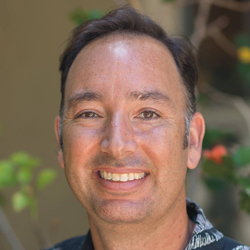
Gabe Johnson
1. In 100 words or less, please tell us your background, including details about your family, education, and experience in the public, private, and non-profit sectors.
I was born in 1973 in Miami, Florida to a Puerto Rican father and a half Okinawan mother and later raised by my mother and full-blooded Okinawan grandmother in Cleveland, Ohio. I attended Cleveland Central Catholic High School and graduated with a Bachelor of Arts degree in English from Kent State University. I moved to Hawai‘i 16 years ago to teach at Lahaina intermediate. Soon after I made Lāna‘i my home and have worked in the service industry, conservation, and later as a farmer.
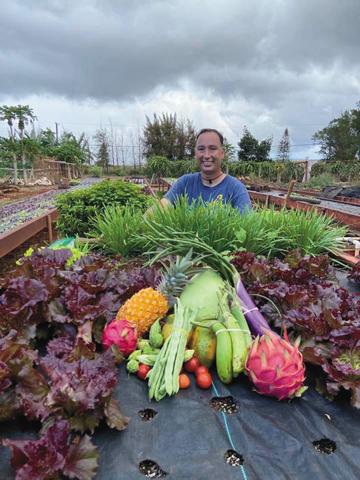
Photos courtesy of Gabe Johnson
2. In 200 words or less, please tell us: a) What is your vision for Maui? b) What is right with Maui? c) What is wrong with Maui?
My vision for Maui is inclusivity. The more the people of Hawai‘i and Maui County come together and share their interests, concerns, and passions, the better. My vision is to end the large gap between the haves and the have nots and create opportunities for our youth and upcoming generations, while at the same time tackling the issues in front of us. In a rich and diverse community such as Maui County we have more than enough resources to build a resilient community that works for everyone. Presently our political will within the Maui County Council is a shining star of morality and thoughtful legislation. We focus on the wellbeing of our community members. That is how it should be. We are not immune to social ills and presently our system is set up for a winner take all economy and I am working hard for equality and economic justice.
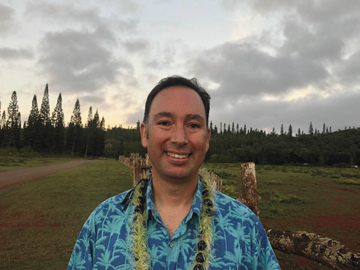
Photos courtesy of Gabe Johnson
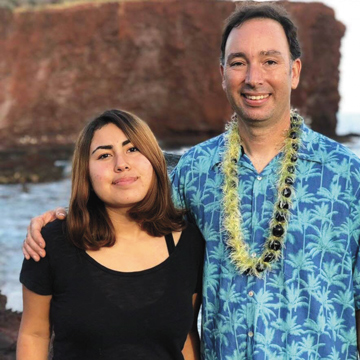
Photos courtesy of Gabe Johnson
3. In 125 words or less, please describe your relationship with Maui’s Filipino community.
I live on Lāna‘i. As many of your readers know, there is a large Filipino community made up of very diverse people. My roommate is Visayan, and many of my friends are Ilocano. Prior to COVID our Saturday market in Dole Park was a great meeting place and a mixture of cultures. I could eat pansit, blood meat, and all types of authentic Filipino food. Lāna‘i has had a long history of Filipino workers who toiled the pineapple fields. Today the legendary union strike of 1950 adds to the rich history of Lāna‘i. Our place names have a story to tell about the plantation days and our history books include many Filipino leaders.
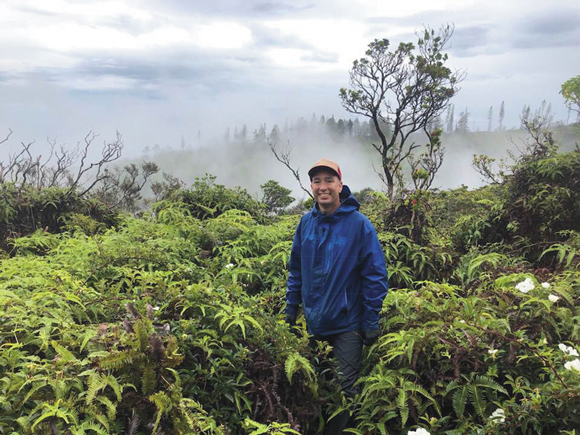
Photos courtesy of Gabe Johnson
4. In 500 words or less, please identify and explain the three greatest needs of Maui’s Filipino community.
The needs of Maui County’s Filipino community is mirrored through much of our working class members’ needs. First, affordable housing is key to folks who live and work here. As your chair of the Affordable Housing Committee, I take seriously my duty to provide truly affordable housing to our workers. Secondly, as a parent I see the struggle our youth are facing with making ends meet and living a happy and healthy life. We are losing our youth because we are not giving them solid opportunities. Many of us work 2 or 3 jobs so that we can raise our children. As our children join the workforce, we must provide better jobs and educational opportunities to keep them here and avoid the brain drain that makes them move away. Finally, the need to take care of our older community members is a top priority for me. Senior housing, healthcare, and better social services are top issues for our kūpuna. The County can do well by funding programs to address these issues.
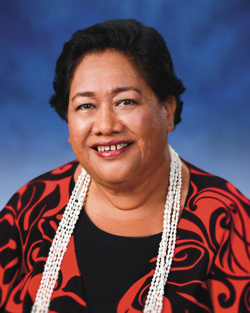
Tasha Kama
1. In 100 words or less, please tell us your background, including details about your family, education, and experience in the public, private, and non-profit sectors.
I have been a community organizer for nearly 40 years. While raising my 11 children and welcoming 31 grandchildren and two (soon three) great grandchildren, I also invested time in numerous community organizations. I volunteered with the ‘Īao School PTSA, founded the Waiohuli-Kēōkea Homestead Associations that advocated for infrastructure from the Department of Hawaiian Home Lands, served on the commission to compensate OHA trustees, sat on the Hawaiian Sovereignty Advisory and Elections Commission and assisted various other organizations. To better serve my community, I earned a degree in Human Services from the University of Hawai‘i – Maui College.
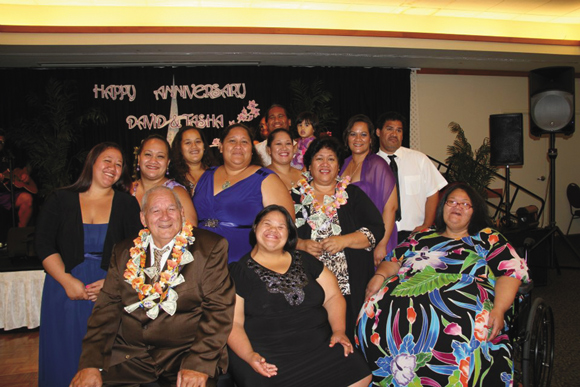
Photo courtesy Tasha Kama
2. In 200 words or less, please tell us:
a. What is your vision for Maui?
I envision a community that is not only safe and healthy, but also thriving. People would be able to buy or rent a home they can afford, work at stable jobs, start a business if they desired. The aloha spirit would be alive and well, where neighbors looked after each other and visitors understand the importance of respecting our island’s environment and customs.
b. What is right with Maui?
Having been born and raised in the islands, I can say there truly is no place on earth like Maui. It is a beautiful place that has welcomed generations of people who came here to work and live, while tasking us with preserving its “ano” (sacredness).
c. What is wrong with Maui?
I see it more as an ongoing challenge, than something that is particularly “wrong,” but it certainly takes all of us working together to protect the people and the land that make our island home so special. We have our differences, but with mutual respect and a commitment to having the difficult conversations, we can overcome some of the chaos and dissatisfaction we have seen recently. Our ancestors have given us a wealth of knowledge on how to resolve conflict successfully, but it takes effort and integrity.
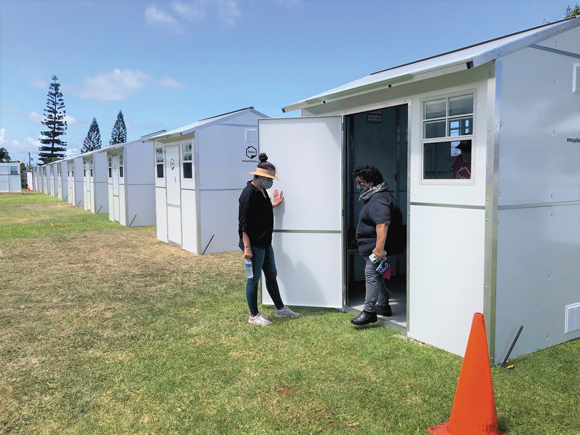
Photo courtesy Tasha Kama
3. In 125 words or less, please describe your relationship with Maui’s Filipino community.
My relationship with the Filipino community began when I was a new student at Mannheim Elementary school, and I was in third grade. The first student to approach me was a girl from Hilo who was of Filipino descent. Through her friendship I experienced firsthand the many ways that Filipinos are gracious, kind and helpful. Her father transferred to another duty station, but I never forgot how she made me, a total stranger, feel at ease. Since then, I have been blessed to have gained many Filipino friends and family members as cousins, aunties, uncles, nieces, nephews, in-laws, grandchildren and great grandchildren. I am also glad to support our Filipino community by helping secure funding for projects and important initiatives.
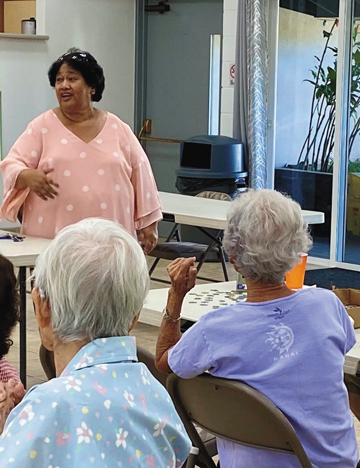
Photo courtesy Tasha Kama
4. In 500 words or less, please identify and explain the three greatest needs of Maui’s Filipino community.
Since coming to the islands in the early 1900s, Filipinos have worked hard to provide for their families, seek education, instill community-oriented values and ensure a successful future for the next generation. With the economic and health challenges now upon us, it has become more difficult to achieve these goals.
Our Filipino community needs the support of government leaders to ensure that families and individuals have a variety of work opportunities to provide steady and fulfilling employment, whether as employees in various sectors or as business owners. While our economy remains heavily dependent on tourism, there are new opportunities such as online commerce and remote working that offer flexibility and a living wage. Financial counseling can also be helpful for those saving up to buy a home or dealing with back rent or utility payments. Services provided through County contracts with Hawaiian Community Assets, MEO, Catholic Charities Hawai‘i and other agencies can help anyone in need of guidance and assistance.
It is also crucial that our family-oriented Filipino community has access to affordable homes to buy or rent, as they are a solid foundation for our overall community. Access to health care is also important, as many working in service industries have experienced higher Covid risk and death rates than all other ethnic groups in the state. We must ensure that Filipinos have the health resources and knowledge they need to stay healthy despite the ongoing pandemic.
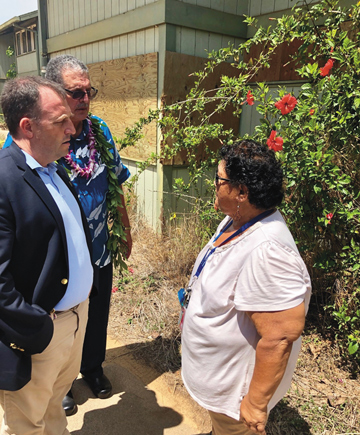
Photo courtesy Tasha Kama
I also believe that Filipinos need greater representation in and more active engagement with local government. Filipinos of all ages with an interest in the legislative process can participate in Council proceedings, and more Filipino candidates would help their community’s voices be heard.
It is also critical that Filipinos have access to County and State services with regard to immigration support, as many families are grappling with oft-changing federal regulations and restrictions. Recognizing that the growth of families is a substantial component of my vision for Maui County, the County should do what it can to assist Filipino families who have staked their future on this special place to reunite with their loved ones.
Lastly, while this question focused on what the Filipino community needs, I would argue that, more importantly, our Maui community needs the Filipino community with its energy, drive and proven success to help us succeed in a post-tourism-dependent and post-Covid economy. Maui County is in the crux of re-envisioning its economy and we need the Filipino community to help lead us to a prosperous future with greater equity of opportunity for all.
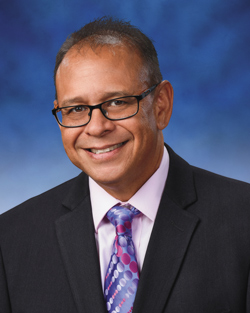
Mike Molina
1. In 100 words or less, please tell us your background, including details about your family, education, and experience in the public, private, and non-profit sectors.
Mike Molina, Maui County Councilmember 2001-2010, 2019-Present. Authored major housing and environmental legislation (Affordable Housing Fund, First Time Home Buyers Fund, Outdoor Lighting Bill, Plastic Bag Reduction Law.) Born in Wailuku, Maui and currently resides in Makawao, Maui. Graduated from Maui High School 1978. Served in the United States Air Force and Hawai‘i Air National Guard. Graduated from University of Hawai‘i at Hilo. I am a former public school teacher and Maui Chapter President, of the Hawai‘i State Teachers Association. My spouse, Cielo Batan Molina, is Tagalog and was born in Manila and raised in Quezon City. We have three children.
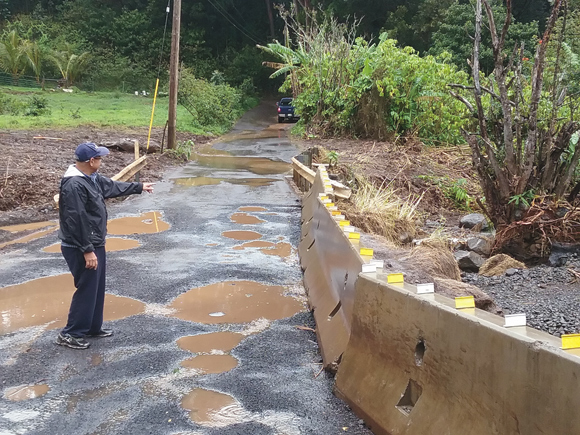
Photo courtesy Mike Molina
2. In 200 words or less, please tell us: a) What is your vision for Maui? b) What is right with Maui? c) What is wrong with Maui?
My vision for Maui County is to continue our economic recovery from the pandemic by diversifying our economy which includes expanding our agriculture, health care and technology industries while balancing our economic growth with the need to protect our environment.
What is going right for Maui County is that I am honored to be part of a County Council that responds to many concerns expressed by the public. Our Council continues to provide funding to improve our parks, roads, public safety, and social services. We have also passed legislation that protects our environment and supports affordable housing.
What is not right for Maui County is the desperate need for more affordable housing. Over tourism is also a problem. While tourism provides jobs and tax revenue it also impacts our residents quality of life with more traffic, less beach parking for our residents and tourists who disrespect our culture and environment. We need to hold the tourism industry accountable for these impacts and continue to find ways to limit the impacts of the visitor industry.
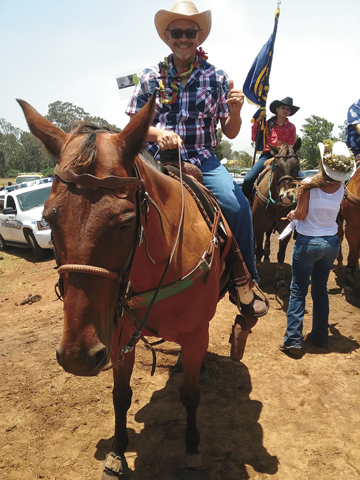
Photo courtesy Mike Molina
3. In 125 words or less, please describe your relationship with Maui’s Filipino community.
I have tremendous respect and appreciation for the Filipino culture and have always worked towards establishing an open, and positive relationship with leaders of the Filipino community. I am grateful for the contributions made to Maui County by our present and past Filipino leaders. Over the years, I have supported funding requests for Immigrant Services, the Barrio Fiesta, and the Binhi at Ani Community Center. I will continue to do my part to encourage members of the Filipino community to become involved with government and not be afraid to express their opinions to Local, State and Federal government leaders.
4. In 500 words or less, please identify and explain the three greatest needs of Maui’s Filipino community.
Affordable Housing is the first of three needs of our Filipino community. Due to the high cost of housing, many families are forced to live in one house which can cause a lot of stress and inconvenience. Government needs to continue to partner with the private sector to secure land and provide affordable housing opportunities to help Filipino families achieve the dream of home ownership. Providing affordable housing opportunities will keep many talented and skilled Filipino professionals here which benefit our community over the long term.
Another need of our Filipino community is to work towards improving their socio-economic status thru higher education. Government needs to work with Filipino community leaders to provide opportunities and encourage Filipinos to seek higher education that will open the doors for higher status and better paying jobs that will elevate their socio-economic status. Providing more higher educational opportunities here for younger Filipino’s will also reduce educational expenses for parents.
The third greatest need is for all Filipino groups to collectively work together and put aside differences. If all Filipino groups can unite and work towards goals that can be agreed upon, the Filipino community can become a very effective political force. It is my hope that Filipino elders can mentor and encourage younger Filipinos to take leadership positions and to become involved community issues.
